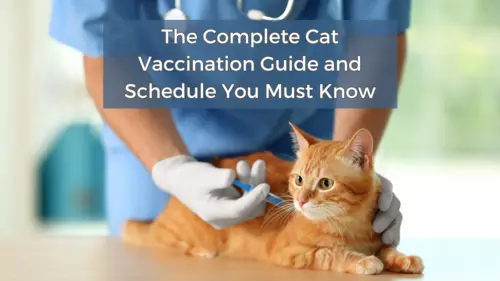
Admin / 4 -September -2023 – The Complete Cat Vaccination Guide and Schedule You Must Know
Vaccination is one of the most important ways to keep your cat healthy. Vaccines help protect cats from various diseases that can threaten their lives. This article will discuss the complete cat vaccination commonly recommended by veterinarians and their schedules.
Types of Cat Vaccination
- FVRCP (Feline Viral Rhinotracheitis, Calicivirus, and Panleukopenia) vaccine: This vaccine is one of the most important and frequently recommended for cats. It protects against three diseases at once: rhinotracheitis (inflammation of the upper respiratory tract), calicivirus (infection of the respiratory tract and mouth), and panleukopenia (also known as feline distemper).
- Rabies Vaccine: Rabies vaccination is mandatory in many places, and your pet cat should not skip this vaccine. Rabies is a disease that can be transmitted to humans, so the rabies vaccination not only protects your cat but also protects you and your family.
- Felin Leukaemia Vaccine (FeLV): This vaccine is recommended especially for cats with a high risk of getting feline leukemia, such as cats that live outdoors or have contact with feral cats. Felin leukemia is a contagious and serious disease in cats.
- Chlamydia vaccine: This vaccine protects cats against Chlamydia felis infection, which can cause conjunctivitis (eye inflammation) and respiratory problems.
- Bordetella vaccine: This vaccine is recommended if you plan to take your cat to daycare or if you have multiple cats in one household. Bordetella is the main cause of feline cough.
Cat Vaccination Schedule
Cat vaccination schedules may vary depending on your cat’s age, health condition, and the environment in which your cat lives. However, in general, here are general guidelines for vaccination schedules:
- 6-8 Weeks of Age: The first FVRCP vaccine is usually given at this age. The FeLV vaccine may also be given if your cat is at high risk of developing feline leukemia.
- 12 Weeks of Age: The second FVRCP vaccine is given at this age, along with a second FeLV vaccine if required.
- 16 Weeks of Age: The third FVRCP vaccine is given. Depending on local laws, the Rabies vaccine may also be given at this age.
- Next Year and Beyond FVRCP and rabies vaccines need to be renewed annually or according to your veterinarian’s guidance. FeLV vaccines also need to be updated according to your cat’s risk.
- Additional Vaccines: Chlamydia and Bordetella vaccines are not usually given at every routine vaccination visit and are only given if your cat is at high risk of developing these diseases.
In addition to vaccinations, it is important to maintain a clean and healthy environment for your cat. Consult your vet for a vaccination schedule that suits your cat’s needs. Remember that vaccinations are one important step in keeping your pet cat healthy, but good care also includes quality food, regular medical attention, and boundless love.
